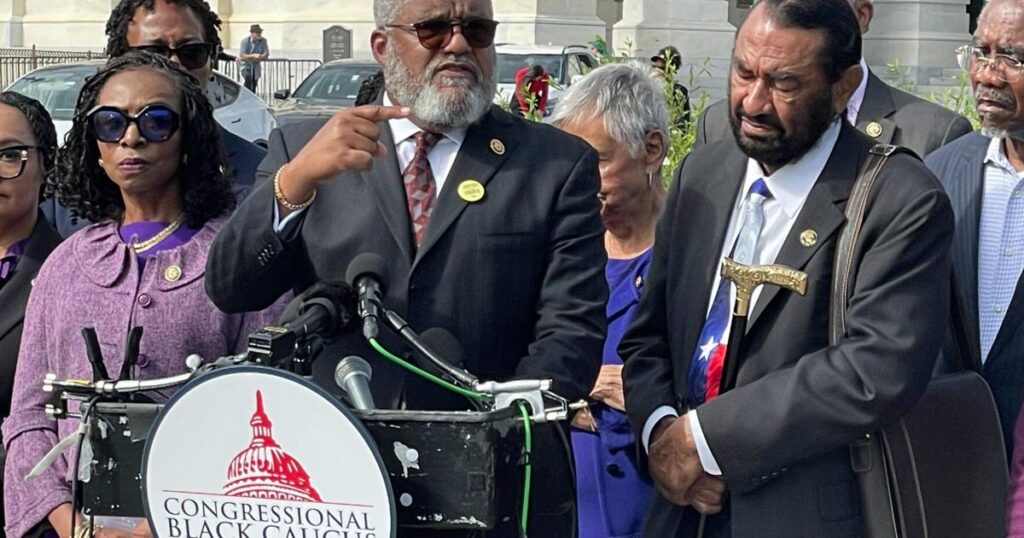WASHINGTON — A neutering by the Supreme Court of the Voting Rights Act’s last remaining major provision could trigger a political avalanche — an event that starts narrow but gains momentum across the national map. In this case, the benefit would likely go to Republicans aiming to maintain a House majority, perhaps for many years to come.
This scenario seemed more plausible Wednesday after the court’s conservative majority indicated a willingness to limit race-based districts under Section 2 of the Voting Rights Act. This landmark civil rights law requires legislative districts to be drawn in a way that allows minorities to elect representatives of their choosing. As a result, majority-Black and Latino districts have been created that reliably vote Democratic, even in some of the nation’s most conservative states.
### The Louisiana Case and Its Potential Ripple Effect
Plaintiffs in Louisiana brought a case before the Supreme Court after the state was ordered by a federal judge to redraw its congressional map to include a second majority-Black district. This district was won by a Democrat last year. If the plaintiffs prevail, it could revert that district back to a likely Republican seat, possibly eliminating another Democratic seat also mandated under the Voting Rights Act.
This change could ripple across the South. The Democratic group Fair Fight found there are 19 Voting Rights Act-mandated, Democratic-held seats that Republicans could potentially redraw to their advantage.
“I’m really worried that, given the political climate we’re in, the conservative nature of this court, and recent rolls back on affirmative action and executive power, this will not end well for us,” said Rep. Terri Sewell, an Alabama Democrat.
### Challenges in Predicting GOP Gains
Republicans have increasingly complained about Section 2, arguing that it forces them into a Catch-22: either they violate the Constitution by using racial factors in redistricting or face lawsuits if they do not sufficiently consider racial groups that lean Democratic.
“We are damned if we do and damned if we don’t,” Louisiana Attorney General Elizabeth Murrill said.
If the court sides with Louisiana, some Democratic members of Congress hope the ruling will be narrowly tailored rather than an all-out assault on the Voting Rights Act’s key provision.
Even if the ruling delivers a broader blow, it’s unlikely that most affected districts could be redrawn before the 2026 midterm elections. The number of seats that could ultimately swing to the GOP is probably smaller than feared.
Still, with the House decided by a razor-thin margin in recent elections—the GOP currently controls the chamber by just three votes—every seat counts.
“It makes it harder for Democrats to create a majority if they are eliminating only Democratic districts,” said Jonathan Cervas, a political scientist at Carnegie Mellon University who has helped draw maps under court orders in multiple Voting Rights Act-related cases. However, he cautioned against overestimating potential Republican gains. “None of us can even know this,” Cervas said. “We’re talking about real ceilings here.”
### Limits on GOP Advantages Despite Section 2 Changes
Even if Section 2 were eliminated, Democratic-leaning voters would remain. Republican mapmakers would still need to consolidate these voters somewhere—likely in districts that remain Democratic.
For example, Tennessee’s Republican-controlled legislature drew a highly partisan map in the last redistricting cycle, producing seven safe Republican seats and one Democratic district in Memphis compliant with the Voting Rights Act. Cervas notes there’s no way for Republicans to flip that seat. Scattering the city’s voters into neighboring GOP-heavy districts might increase competition but not guarantee a GOP win.
Missouri and South Carolina face similar challenges with their heavily Democratic districts, while more competitive states like Georgia cannot easily eliminate Democratic seats without risking Republican ones.
Some GOP-controlled states, like Mississippi, may find it easier to eliminate their lone Democratic Voting Rights Act-mandated seat. Larger battleground states such as North Carolina and Florida offer Republicans more leeway to redraw maps favoring their party without preserving majority-minority districts.
### Congressional Black Caucus Warns of Extreme Gerrymandering
Following Wednesday’s Supreme Court arguments, members of the Congressional Black Caucus warned a broad ruling against Section 2—which allows challenges to racially discriminatory electoral practices—could lead to extreme gerrymandering by Republicans.
This, they say, could leave many Black voters without meaningful representation in Congress.
“If you take away the elements that create the opportunity for it to look like its people, it won’t be a democracy as we hoped it would be,” said Rep. Troy Carter, a Louisiana Democrat representing much of New Orleans. “It will be a much weaker one, ultimately on the road to an oligarchy, not a democracy.”
### Timeline for Possible Redistricting Changes
Republicans are already engaged in a national, mid-decade redistricting push. President Donald Trump wants to maximize the number of winnable seats to avoid losing control of the House in 2026, as the incumbent president’s party typically loses seats in midterms.
However, many Republican-controlled states may not be able to take advantage of any loosened Voting Rights Act standards in time for 2026 elections. The Supreme Court’s ruling is expected by early summer 2026, likely after most states’ congressional filing deadlines.
While some states might attempt extraordinary measures to implement favorable changes sooner, most would likely incorporate adjustments into maps for 2028 and beyond.
Still, Democrats remain on edge about potential impacts.
“If they were to strip Section 2, I think that would give license to more aggressive redistricting, which has been blocked throughout the country,” said Rep. Sheila Cherfilus-McCormick, a Florida Democrat representing a majority-minority district in South Florida.
House Minority Leader Hakeem Jeffries echoed the concern, calling the Voting Rights Act “the most important piece of civil rights legislation ever enacted,” highlighting its ongoing relevance amid efforts to undermine free and fair elections, especially for communities of color.
### Effects Beyond Congress
Kareem Crayton of the Brennan Center for Justice emphasized that any changes would affect more than just congressional districts. Three-quarters of all Section 2 cases involve state or local government offices, including city councils, county commissions, and school boards.
“These are the entities closer to the people,” Crayton said. “They have directly benefited from plaintiffs suing to secure representation that allows people to engage in traditional politics.”
As the Supreme Court weighs this critical case, the future of minority representation and the balance of power in the House hang in the balance.
https://www.phillytrib.com/news/across_america/supreme-court-case-could-lead-to-loss-of-black-representation-in-congress-but-the-scope/article_ffb8f436-cea3-47fb-a97f-1684fdc90275.html

